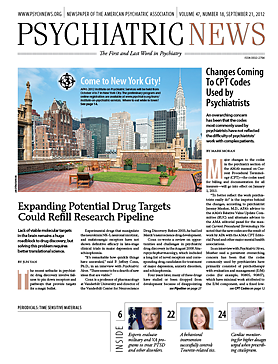Recent media reports have discussed the declining number of applicants for U.S. psychiatry residency programs this year in what was sometimes termed the psychiatric profession’s identity crisis.
The debate around the future of psychiatry frequently focuses on the content of the upcoming DSM-5, including the changes anticipated in some diagnostic categories and on the disorders that may be included or excluded.
It is not clear that debating the merits of changes in the next DSM edition or addressing the influence of pharmaceutical companies on the profession will help recruit more psychiatry residents, although those debates need to happen. Nor is it clear that psychiatry’s attempts to be more “scientific” make the field more attractive to future physicians either. Often, being more “scientific” has seemed to translate largely into an emphasis on the biological side, with little emphasis on psychological/social scientifically validated approaches to mental illness.
The current problem psychiatry is facing can be conceptualized as a three-legged stool, with access, diagnosis, and treatment as the three legs. A real change won’t happen in psychiatry unless we target all three legs of that stool.
The first leg is lack of access: 67 percent of people with a DSM-IV diagnosis are not in any type of treatment, according to a 2005 article in the New England Journal of Medicine by Kessler and colleagues.
Second is a need for correct diagnoses: 50 percent of people who received mental health treatment, in any setting, had no psychiatric diagnosis, according to Kessler and colleagues.
The third issue is lack of effective treatment practices: over the last 15 years, the field made great advances in reaching out and effectively treating people with mental illness. Kessler and colleagues showed that the treatment rate for people with serious mental disorder rose from 24.3 percent in 1990–1992 to 40.5 percent in 2001–2003.
However, over the same period, psychotropic medication use in general and off-label use and polypharmacy in particular have increased, with little indication of concurrent changes in patients’ illness severity or comorbidity, Mojtabai and colleagues said in a 2010 article in the Archives of General Psychiatry.
So how can we improve the current system? One good start is to focus on primary care. Given that 50 percent of mental health care is delivered outside of specialty services, and 79 percent of antidepressants, 87 percent of anxiolytics, and 51 percent of antipsychotics are prescribed by nonpsychiatrists, psychiatry ought to be an integral part of the primary care sector.
Collaborative care—providing mental health services in primary care clinics—should become one of the main activities for psychiatrists. Two-thirds of primary care physicians reported in 2004–2005 that they could not get outpatient mental health services for patients—a rate that was at least twice as high as that for other services. While there are many obstacles, including rigid financial compensation schemes and outmoded billing practices, models for success, such as the University of Washington’s IMPACT program and others that implement psychiatry in primary care, have proved that it can be done.
These models could potentially target all three legs of the stool. Unützer, Katon, and colleagues showed that such models improve access to mental health services by using patient registries and adopting a population-based mental health perspective. Diagnosis can be improved through supporting primary care doctors in identifying and treating psychiatric disorders and having psychiatrists making direct consultations to the clinic.
These collaborative settings can allow for a variety of evidence-based treatments, including not only medication, but also time-limited psychotherapies. They also employ coordinators to integrate patients’ general medical and psychiatric needs, because patients’ symptoms are rarely isolated according to our segregated specializations. Patients’ symptoms and needs drive treatment decisions using evidence-based algorithms, and outcomes are measured using validated clinical scales. The time has come for psychiatry to embrace measurements of clinical outcomes, not only because their applications result in good clinical care, but also because it will facilitate improving our practices through quality-improvement projects. This will bring the field closer to evidence-based medicine and the quality-improvement movement, and it will facilitate our integration in the coming accountable care organization models.
The biopsychosocial framework has been used as a holistic approach to our patients. It makes sense that the solution to psychiatry’s identity crisis must focus not only on the biological side of the field, but also on the psychological side (treatment) and the social side (access, relationship with primary care, and the general public). This approach alone won’t necessarily increase the numbers of medical students matching into psychiatry—the recruitment issue is complex and relates as much to psychiatry as to the larger health care field. However, it will help make the field more user friendly, transparent, and scientific in ways that will appeal to a larger number of future physicians.

Andres Barkil-Oteo, M.D., M.Sc., is an assistant professor of psychiatry at Yale School of Medicine.

